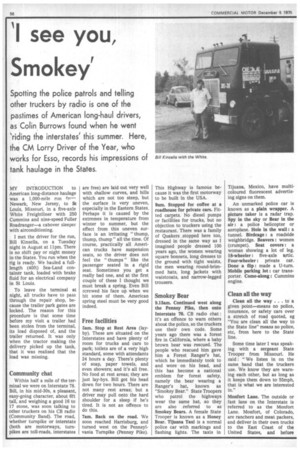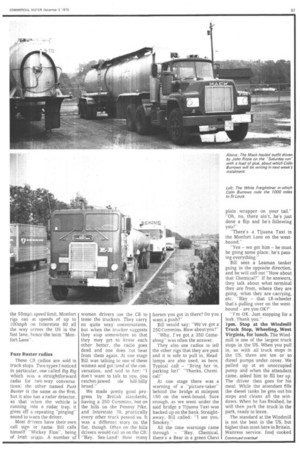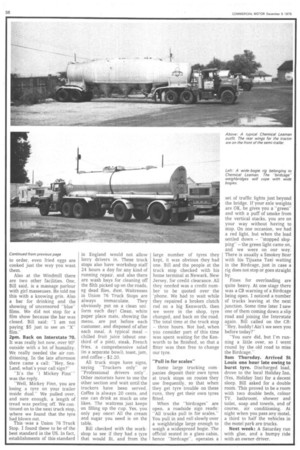'I see you, Smokey'
Page 58

Page 59

Page 60

If you've noticed an error in this article please click here to report it so we can fix it.
Spotting the police patrols and telling other truckers by radio is one of the pastimes of American long-haul drivers, as Colin Burrows found when he went 'riding the interstates' this summer. Here, the CM Lorry Driver of the Year, who works for Esso, records his impressions of tank haulage in the States.
MY INTRODUCTION to American long-distance haulage was a 1,000-mile run frr — Newark, New Jersey, to St Louis, Missouri, in a five-axle White Freightliner with 250 Cummins and nine-speed Fuller Roadranger—a cabover sleeper with airconditioning.
I met the driver for the run, Bill Kinsella, on a Tuesday night in August at llpm. There is no shift pay or night money in the States. You run when the rig is ready. We hauled a fulllength (4 Oft) Sea-Land container tank, loaded with brake fluid for an electrical company in St Louis.
To leave •the terminal at night, all trucks have to pass through the repair shop, because the trailer park gates are locked. The reason for this procedure is that some time before my visit a trailer had been stolen from the terminal, its load disposed of, and the trailer returned. It was only when the tractor making the delivery picked up the tank, that it was realised that the load was missing.
Community chat
Within half a mile of the terminal we were on Interstate 78. Bill, in his mid-30s, a pleasant, easy-going character, about 6ft tall, and weighing a good 16 to 17 stone, was soon talking to other truckers on his CB radio (Community Band). The road, whether turnpike or interstate (both are motorways, turnpikes are toll-roads, interstates are free) are laid out very well with shallow curves, and hills which are not too steep, but the surface is very uneven, especially in the Eastern States. Perhaps it is caused by the extremes in temperature from winter to summer, but the effect from this uneven surface is an irritating " thump, thump, thump" all the time. Of course, practically all American trucks have suspension seats, so the driver does not feel the " thumps" like the passenger seated in a rigid seat. Sometimes you get a really bad one, and at the first couple of these I thought we must break a spring. Even Bill screwed his face up when we hit some of them. American spring steel must be very good indeed.
Free facilities
5am. Stop at Rest Area (layby). These are situated on the Interstates and have plenty of room for trucks and cars to park; toilets are of a very high standard, some with attendants 24 hours a day. There's plenty of soap, paper towels, and even showers; and it's all free. No food at rest areas; they are just lay-bys. Bill got his head down for two hours. There are not many rest areas; but a driver may pull onto the hard shoulder for a sleep if he's tired. It is not an offence to do this.
7am. Back on the road. We soon reached Harrisburg, and turned west on the Pennsylvania Turnpike (Pennsy Pike). This Highway is famous because it was the first motorway to be built in the USA.
9am. Stopped for coffee at a roadhouse for private cars. Fitted carpets. No diesel pumps or facilities for trucks, but no objection to truckers using the restaurant. There was a family of Quakers stopped here too, dressed in the same way as I imagined people dressed 100 years ago, the women wearing square bonnets, long dresses to the ground with tight waists, the men wearing round-brimmed hats, long jackets with waistcoats, and narrow-legged trousers.
Smokey Bear
9.15am. Continued west along the Pennsy Pike, then onto Interstate 70. CB radio chat : it's an offence to warn others about the police, so the truckers use their own code. Some years ago there was a forest fire in California, where a baby brown bear was rescued. The people who rescued him gave him a Forest Ranger's hat, which he immediately took to and wore on his head, and this has become a national emblem for forest safety, namely the bear wearing a Ranger's hat, known as "Smokey Bear." State Troopers who patrol the highways wear the same hat, so they are also referred to as Smokey Bears. A female State Trooper is known as a Honey Bear. Tijuana Taxi is a normal police car with markings and flashing lights. The taxis in Tijuana, Mexico, have multicoloured fluorescent advertising signs on them.
An unmarked police car is known as a plain wrapper. A picture taker is a radar trap. Spy in the sky or Bear in the air : a police helicopter or aeroplane. Hole in the wall : tunnel. Birdcage : a roadside weighbridge. Beavers : women (crumpet). Seat covers : a woman showing a lot of leg. 18-wheeler : five-axle artic. Four-wheeler : private car. Done a flip : made a U-turn. Mobile parking lot : car transporter. Come-along : Cummins engine.
Clean all the way
Clean all the way . . . to a given point—means no police, insurance, or safety cars over a stretch of road quoted, eg "You are clean all the way to the State line" means no police, etc, from here to the State line.
Some time later I was speaking with a sergeant State Trooper from Missouri. He said : "We listen in on the same. band that the truckers use. We know they are warning each other, but as long as it keeps them down to 55mph, that is what we are interested in."
Monfort Lane. The outside or fast lane on the Interstate is referred to as the Monfort Lane. Monfort, of Colorado, are ranchers and meat packers, and deliver in their own trucks to the East Coast of the United States, and before the 55mph speed limit, Monfort rigs ran at speeds of up to 100mph on Interstate 80 all the way across the US in the fast lane, hence the term "Monfort Lane".
Fuzz Buster radios These CB radios are sold in truck stops. Two types I noticed in particular, one called Big Rig which was a straightforward radio for two. way conversations; the other named Fuzz Buster is the same as the first, but it also has a radar detector, so that when the vehicle is running into a radar trap, it gives off a repeating "pinging" sound to warn the driver.
Most drivers have their own call sign or name. Bill calls himself "Mickey Finn", being of Irish origin. A number of women drivers use the CB to tease the truckers. They carry on quite sexy conversations, but when the trucker suggests they stop somewhere so that they may get to know each other better, the radio goes dead and one does not hear from them again. At one stage Bill was talking to one of these women and got tired of the conversation, and said to her: "I don't want to talk to you, you ratchet-jawed ole hill-billy broad."
We made pretty good progress by British standards, having a 250 Cummins, but on the hills on the Pennsy Pike, and Interstate 70, practically every other truck passed us. It was a different story on the flat, though. Often on the hills drivers would call us on the CB: "Hey, Sea-Land! How many horses you got in there? Do you want a push?"
Bill would say: "We've got a 250 Cummins. How about you?"
"Why, I've got a 350 Comealong" was often the answer.
They also use radios to tell the other rigs that they are past and it is safe to pull in. Headlamps are also used, as here. Typical call — "Bring her in, parking lot!" "Thanks, Chemical!"
At one stage there was a warning of a "picture-taker" behind the bridge at milepost 150 on the west-bound. Sure enough, as we went under the said bridge a Tijuana Taxi was backed up on the bank. Straightaway, Bill called: "I see you, Smokey."
All the time warnings came through — "Hey, Chemical, there's a Bear in a green Chevi plain wrapper on your tail." "Oh, no, there ain't, he's just done a flip and he's following your "There's a Tijuana Taxi in the Monfort Lane on the westbound."
"Yea — we got him — he must be going some place; he's passing everything."
Bill sees a Leaman tanker going in the opposite direction, and he will call out "How about that Chemical?" If he answers, they talk about what terminal they are from, where they are going, what they are carrying, etc. "Hey — that 18-wheeler that's pulling over on the westbound — are you OK?"
"I'm OK. Just stopping for a leak. Thank you."
Ipm. Stop at the Windmill Truck Stop, Wheeling, West Virginia, for lunch. The Windmill is one of the largest truck stops in the US. When you pull in, as with all truck stops in the US, there are ten or so diesel pumps under cover. We pulled up at an unoccupied pump and when the attendant came, asked him to fill her up. The driver then goes for his meal. While the attendant fills the diesel tanks he gets out his steps and cleans all the windows. When he has finished, he will then park the truck 'in the park, ready to leave.
The standard at the Windmill is not the best in the US, but higher than most here in Britain. Waitress service, food cooked to order, even fried eggs are cooked just the way you want them.
Also at the Windmill there are two other facilities. One, Bill said, is a massage parlour with girl masseuses. He told me this with a knowing grin. Also a bar for drinking and the showing of uncensored "blue" films. We did not stop for a film show because the bar was closed. Bill said: "I am not paying $5 just to see an film."
2pm. Back on Interstate 70. It was really hot now, over 900 outside with a lot of humidity. We really needed the air conditioning. In the late afternoon there came a call: "Hey, SeaLand, what's your call sign?"
"It's the 'I Mickey Finn'' was the reply.
"Well, Mickey Finn, you are losing a tyre on your trailer inside dual." We pulled over, and sure enough, a length of tread was peeling off. We continued on to the next truck stop, where we found that the tyre had blown out.
This • was a Union 76 Truck Stop. I found these to be of the best standard in the US. In fact, establishments of this standard in England would not allow lorry drivers in. These truck stops also have workshop staff 24 hours a day for any kind of running repair, and also there are wash bays for cleaning off the filth picked up on the roads, eg dead flies, dust. Waitresses in Union 76 Truck Stops are always immaculate, They obviously put on a clean uniform each day! Clean, white paper place mats, showing the menu, are put before each customer, and disposed of after each meal. A typical meal — chilled fruit juice (about onethird of a pint), steak, French fries, a comprehensive salad (in a separate bowl), toast, jam, and coffee 7 $2.20.
All truck stops have signs, saying "Truckers only" or "Professional drivers only". Other motorists have to use the other section and wait until the truckers have been served. Coffee is always 20 cents, and one can drink as much as one likes. The waitress just keeps on filling up the cup. Yes, you only pay once! All the cream and sugar you need is on the table.
Bill checked with the workshop to see if' they had a tyre that would fit, and from the large number of tyres they kept, it was obvious they had one. Bill and the people at the truck stop checked with his home terminal at Newark, New Jersey, for credit clearance. All they needed was a credit number to be quoted over the 'phone. We had to wait while they repaired a broken clutch rod on a big Kenworth, then we were in the shop, tyre changed, and back on the road. The total time at the truck stop — three hours. Not bad, when you consider part of this time was spent waiting for the Kenworth to be finished, so that a fitter was then free to change our tyre.
"Pull in for scales"
Some large trucking companies deposit their own tyres at truck stops on routes they use frequently, so that when they get tyre trouble on these runs, they get their own tyres fitted.
When the "birdcages" are open, a roadside sign reads: "All trucks pull in for scales." You pull in and roll slowly over a weighbridge large enough to weigh a widespread bogie. The official seated in a glass cabin, hence "birdcage", operates a set of traffic lights just beyond the bridge. If your axle weights are OK, he gives you a "green" and with a puff of smoke from the vertical stacks, you are on your way without having to stop. On one occasion, we had a red light, but when the load settled down — "stopped slopping" — the green light came on, and we were on our way. There is usually a Smokey Bear with his Tijuana Taxi waiting in the Birdcage, just in case a rig does not stop or goes straight by.
Fines for overloading are quite heavy. At one stage there was a CB warning of a Birdcage being open. I noticed a number of trucks leaving at the next junction. Some time later I saw one of them coming down a slip road and joining the Interstate again. Bill called on the CB: "Hey, buddy! Ain't we seen you before today?"
"You sure did, but I'm running a little over, so I went round by the old road to miss the Birdcage."
9am Thursday. Arrived St Louis one hour late owing to burst tyre. Discharged load, drove to the local Holiday Inn, (Yes, Holiday Inn) for a decent sleep. Bill asked for a double room. This proved to be a room with two double beds, colour TV, bathroom', shower and toilet, soap and towels, and of course, air conditioning. At night when you pass any motel, a third to half the vehicles in the motel park are trucks.
Next week: A Saturday run with glue, and a bumpy ride with an owner-driver.


































































































































